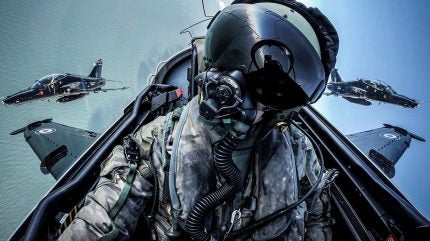
Inspectors from the UK’s education watchdog, Ofsted, have found that trainee personnel in the British Armed Forces are waiting too long in the ‘holdover’ stage – when one training course has finished and another has yet to start.
“In the worst cases, trainee pilots are waiting several years to start their flying training,” the report determined.
Naturally, this has had a detrimental impact on retention and wellbeing in each of the services, none more so than in the Royal Air Force (RAF).
“Consequently, trainees can become bored and demotivated and, in the worse cases, choose to leave the military.”
Quarterly service personnel statistics, since 1 January 2024, suggest a continual decline. Currently at 183,130 people, the number of service personnel has fallen by 7,040 people (decreased by 4%) since last year. This figure has continued to fall from 197,140 people since January 2022.
However, it was found that the quality of training is either ‘good’ or ‘excellent’, with only one area in need of improvement. This means that trainees are very well prepared for their next phase of training or to start their first military job.
How well do you really know your competitors?
Access the most comprehensive Company Profiles on the market, powered by GlobalData. Save hours of research. Gain competitive edge.

Thank you!
Your download email will arrive shortly
Not ready to buy yet? Download a free sample
We are confident about the unique quality of our Company Profiles. However, we want you to make the most beneficial decision for your business, so we offer a free sample that you can download by submitting the below form
By GlobalDataNothing to do in holdover
Where trainees must wait to start their next phase of training, all services need to ensure that trainees are engaged in meaningful activities that maintains their morale while continuing to develop their military and specialist skills.
Too often, all trainees in holdover do similar activities irrespective of whether they need to or not, and some repeat things they have done before, especially if they have been on holdover for some time.
It is said that this has an adverse effect on their motivation, personal lives and career opportunities. They are not given enough information about “when these holdovers will occur, how long they will last and where they will spend them, so are unable to plan accordingly.”
Growing reliance on simulation technologies
This is nothing new for the RAF which has been grilled for enduring problems such as reliability issues with the Hawk T2 fighter trainer, among other issues.
Chief officials have considered new ways to diversify training methods, such as the use of simulation technology.
When confronted with the enduring training problem, the former Chief of the Air Staff, Air Chief Marshal Mike Wigston, told the UK Defence Committee in February 2023 that “modern technology in a simulator… is of better value in a simulated environment. You can put your aircraft in a position that you wouldn’t want to do in a live environment. You can give the student all sorts of stresses that you wouldn’t be able to replicate”.
He is not wrong. Globally, the market for training and simulation equipment is forecast to increase over the next decade, rising from a total value of $29bn in 2022 up to $37.5bn by 2032 at 2.6% compound annual growth rate, according to a GlobalData report on ‘Gamification and Simulation Technology in Defense’ (2024).
Already, the UK Ministry of Defence has granted a Defence Innovation Loan worth £544,742 ($681,000) to VRAI to enable them to apply machine learning algorithms to enhance the actionable insights derived from RAF training data.
Notably, at the end of January 2024, the Defence Committee criticised industry over a lack of a future trainer jet to replace the Hawk, which it argued is in need of a successor now before its life-cycle comes to an end in 16 years’ time.
The Committee fears that the RAF will be left with nothing for real-world training beyond the simulator systems.



